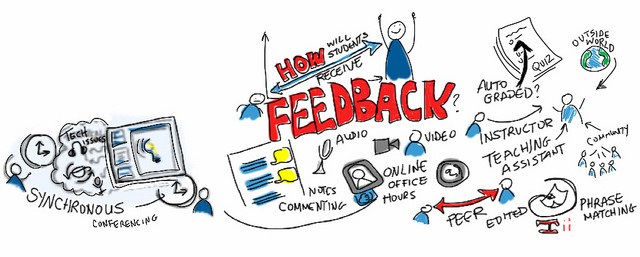How well does student writing improve through giving (and getting) peer feedback? Is the learning maintained in future writing?
Dr. Christina Hendricks, PhD, Sr. Instructor of Philosophy and ArtsONE at UBC, is a proponent of Open Education and an educator with an enquiring mind. While teaching the writing-intensive ArtsONE program to first year students she became curious about the value of their peer feedback process. As a core component of the students’ learning process, how much did peer feedback improve a student’s writing over time? How often was peer feedback needed to help learning “stick”?
Hendricks found that her questions were not answered well enough in the literature. There were gaps. Studies referenced in the SoTL (Scholarship of Teaching and Learning) literature demonstrated how peer feedback helped to improve a student’s writing for a single essay but Hendricks felt that it was important to address the longer-term impact of peer feedback. Some of the questions she asked in her proposal summary included:
- Giving and getting peer feedback improves the writing of the reviewed and revised essay but does what is learned carry over to later papers?
- How long does it take? How many peer feedback sessions are needed to achieve overall improved quality in writing?
Believing that “finding answers to the questions could have a significant impact on teaching and learning”, Hendricks decided to do her own research on peer feedback.
Hendricks’ approach to this, her first SoTL funded research project, is interesting. She said, “…I began to move into the field of the Scholarship of Teaching and Learning, and decided to begin this research project. But I knew I couldn’t do it alone, and needed to find someone to collaborate with who could help me with the design and data analysis. Fortunately, Dr. Biesanz in Psychology was willing!”
Hendricks partnered with colleague Dr. Jeremy Biesanz a UBC Psychology professor and analysis expert and they submitted a successful proposal to the UBC Institute of Scholarship of Teaching and Learning (SoTL), which offers faculty members funding opportunities for research.
Together they carried out the pilot study during the school year from 2013 to 2014. Hendricks presented the preliminary results of the peer feedback research at the BCcampus Symposium on Scholarly Inquiry Into Teaching and Learning, in November 2014.
The results will be fully analyzed in the summer of 2015 and a second, more refined study is planned to start in September 2015 at which time other ArtsONE Instructors will be recruited to join. It is expected that this study will provide enough empirical evidence to support the beginning of a peer feedback strategy for facilitating project-based learning and could have a significant impact on pedagogical practice.
Dr. Hendricks writes, “Though a single study won’t answer these questions, it could be part of a larger body of data that does so. Then that data could be useful to an instructor who is deciding whether or not to include peer feedback activities in their course where students don’t write multiple drafts of a single essay but rather multiple separate essays, and to instructors deciding how many peer feedback activities to include in their classes to get the optimum benefit from them.”
Dr. Hendricks’ passion for open education and for teaching the ArtsONE liberal arts program is evident in her blog, You’re the Teacher.
Notable Quote:
“Though a single study won’t answer these questions, it could be part of a larger body of data that does so. Then that data could be useful to an instructor who is deciding whether or not to include peer feedback activities in their course where students don’t write multiple drafts of a single essay but rather multiple separate essays, and to instructors deciding how many peer feedback activities to include in their classes to get the optimum benefit from them.” C Hendricks PhD

